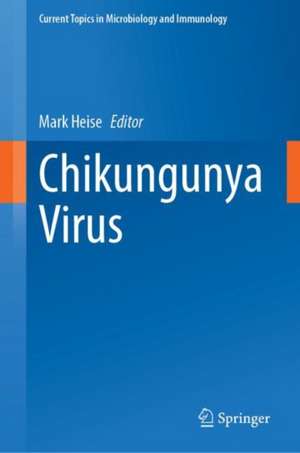Chikungunya Virus: Current Topics in Microbiology and Immunology, cartea 435
Editat de Mark Heiseen Limba Engleză Hardback – 3 feb 2022
Chikungunya virus (CHIKV) is a mosquito-borne pathogen that has re-emerged to become a significant global disease threat. Although CHIKV has historically been associated with localized outbreaks of debilitating polyarthralgia in Africa and Asia, factors such as increased global travel and viral adaptation to new mosquito vectors have led to the introduction and spread of CHIKV in new regions of the world, including the Americas. The re-emergence of CHIKV has stimulated significant interest both in understanding the biology of CHIKV andin the development of medical countermeasures against the virus.
| Toate formatele și edițiile | Preț | Express |
|---|---|---|
| Paperback (1) | 1275.66 lei 6-8 săpt. | |
| Springer International Publishing – 4 feb 2023 | 1275.66 lei 6-8 săpt. | |
| Hardback (1) | 1282.43 lei 6-8 săpt. | |
| Springer International Publishing – 3 feb 2022 | 1282.43 lei 6-8 săpt. |
Din seria Current Topics in Microbiology and Immunology
- 18%
 Preț: 962.03 lei
Preț: 962.03 lei - 5%
 Preț: 1123.13 lei
Preț: 1123.13 lei - 5%
 Preț: 1085.95 lei
Preț: 1085.95 lei -
 Preț: 499.77 lei
Preț: 499.77 lei - 5%
 Preț: 967.81 lei
Preț: 967.81 lei - 18%
 Preț: 1118.62 lei
Preț: 1118.62 lei - 5%
 Preț: 717.00 lei
Preț: 717.00 lei - 5%
 Preț: 712.97 lei
Preț: 712.97 lei - 5%
 Preț: 709.51 lei
Preț: 709.51 lei - 5%
 Preț: 709.51 lei
Preț: 709.51 lei - 5%
 Preț: 721.19 lei
Preț: 721.19 lei - 5%
 Preț: 359.78 lei
Preț: 359.78 lei - 5%
 Preț: 711.88 lei
Preț: 711.88 lei - 5%
 Preț: 774.81 lei
Preț: 774.81 lei - 15%
 Preț: 640.06 lei
Preț: 640.06 lei - 5%
 Preț: 717.00 lei
Preț: 717.00 lei - 5%
 Preț: 360.34 lei
Preț: 360.34 lei - 5%
 Preț: 707.69 lei
Preț: 707.69 lei - 5%
 Preț: 717.56 lei
Preț: 717.56 lei - 5%
 Preț: 716.28 lei
Preț: 716.28 lei - 5%
 Preț: 717.20 lei
Preț: 717.20 lei - 5%
 Preț: 711.32 lei
Preț: 711.32 lei - 5%
 Preț: 711.88 lei
Preț: 711.88 lei - 5%
 Preț: 718.29 lei
Preț: 718.29 lei - 5%
 Preț: 709.51 lei
Preț: 709.51 lei - 5%
 Preț: 369.84 lei
Preț: 369.84 lei - 5%
 Preț: 712.25 lei
Preț: 712.25 lei - 5%
 Preț: 716.45 lei
Preț: 716.45 lei - 5%
 Preț: 706.60 lei
Preț: 706.60 lei - 5%
 Preț: 711.52 lei
Preț: 711.52 lei - 5%
 Preț: 713.54 lei
Preț: 713.54 lei - 5%
 Preț: 720.47 lei
Preț: 720.47 lei - 5%
 Preț: 725.42 lei
Preț: 725.42 lei - 5%
 Preț: 708.06 lei
Preț: 708.06 lei - 5%
 Preț: 713.70 lei
Preț: 713.70 lei - 5%
 Preț: 705.83 lei
Preț: 705.83 lei - 5%
 Preț: 710.96 lei
Preț: 710.96 lei - 5%
 Preț: 723.93 lei
Preț: 723.93 lei - 5%
 Preț: 707.69 lei
Preț: 707.69 lei - 5%
 Preț: 715.35 lei
Preț: 715.35 lei - 5%
 Preț: 709.87 lei
Preț: 709.87 lei - 5%
 Preț: 359.05 lei
Preț: 359.05 lei - 5%
 Preț: 374.20 lei
Preț: 374.20 lei - 15%
 Preț: 635.31 lei
Preț: 635.31 lei - 5%
 Preț: 707.86 lei
Preț: 707.86 lei - 5%
 Preț: 721.96 lei
Preț: 721.96 lei - 15%
 Preț: 632.88 lei
Preț: 632.88 lei - 15%
 Preț: 632.05 lei
Preț: 632.05 lei - 15%
 Preț: 642.83 lei
Preț: 642.83 lei
Preț: 1282.43 lei
Preț vechi: 1349.92 lei
-5% Nou
Puncte Express: 1924
Preț estimativ în valută:
245.47€ • 266.73$ • 206.33£
245.47€ • 266.73$ • 206.33£
Carte tipărită la comandă
Livrare economică 21 aprilie-05 mai
Preluare comenzi: 021 569.72.76
Specificații
ISBN-13: 9783030906092
ISBN-10: 3030906094
Pagini: 139
Ilustrații: XI, 139 p. 10 illus., 7 illus. in color.
Dimensiuni: 155 x 235 mm
Greutate: 0.39 kg
Ediția:1st ed. 2022
Editura: Springer International Publishing
Colecția Springer
Seria Current Topics in Microbiology and Immunology
Locul publicării:Cham, Switzerland
ISBN-10: 3030906094
Pagini: 139
Ilustrații: XI, 139 p. 10 illus., 7 illus. in color.
Dimensiuni: 155 x 235 mm
Greutate: 0.39 kg
Ediția:1st ed. 2022
Editura: Springer International Publishing
Colecția Springer
Seria Current Topics in Microbiology and Immunology
Locul publicării:Cham, Switzerland
Cuprins
Preface.- Molecular Virology of Chikungunya Virus.- Understanding molecular pathogenesis with chikungunya virus research tools.- Chronic Chikungunya Virus Disease.- Chikungunya Virus Vaccines: Platforms, Progress, and Challenges.- Small Molecule Inhibitors Targeting Chikungunya Virus.
Notă biografică
Mark Heise studies the pathogenesis of mosquito-borne and respiratory viruses at the University of North Carolina at Chapel Hill, NC, US. He is Professor of Genetics, Microbiology and Immunology. His laboratory use molecular virology, immunology, and complex trait genetics methodologies to study how viral and host factors interact to promote virus-induced disease.
Textul de pe ultima copertă
This book provides readers with a collection of latest reviews written by Chikungunya virus (CHIKV) research leaders who cover topics related to CHIKV replication, advances in CHIKV research reagents and model system development, as well as the pathogenesis of chronic CHIKV disease. Moreover, the volume updates on recent progress in the development of therapeutics and vaccines for treatment and prevention of CHIKV-induced disease.
Chikungunya virus (CHIKV) is a mosquito-borne pathogen that has re-emerged to become a significant global disease threat. Although CHIKV has historically been associated with localized outbreaks of debilitating polyarthralgia in Africa and Asia, factors such as increased global travel and viral adaptation to new mosquito vectors have led to the introduction and spread of CHIKV in new regions of the world, including the Americas. The re-emergence of CHIKV has stimulated significant interest both in understanding the biology of CHIKV and in the development of medical countermeasures against the virus.
Caracteristici
Summarizes recent advances in understanding both basic CHIKV biology and its pathogenesis Updates on the current status of the global CHIKV outbreak as well as the history of CHIKV epidemics Presents overviews of translational advances toward new CHIKV vaccines and therapies
